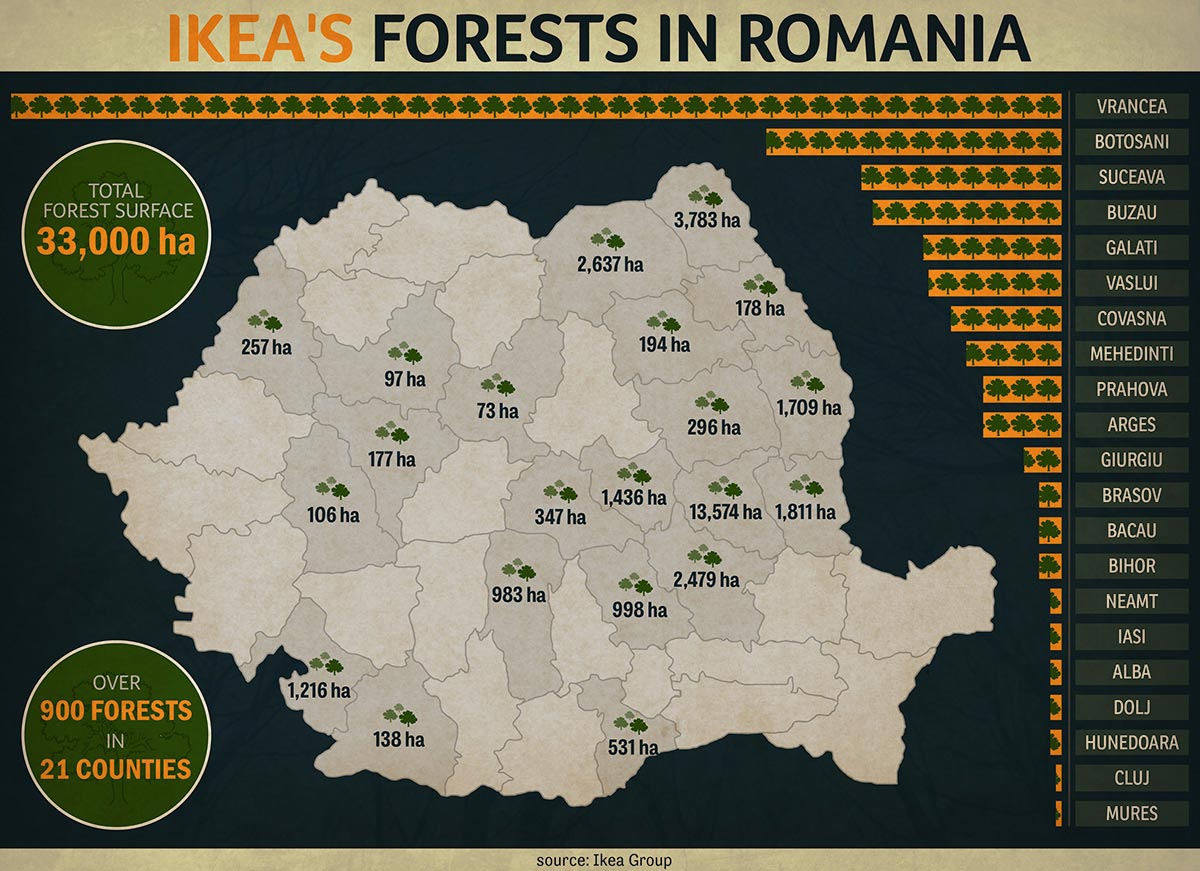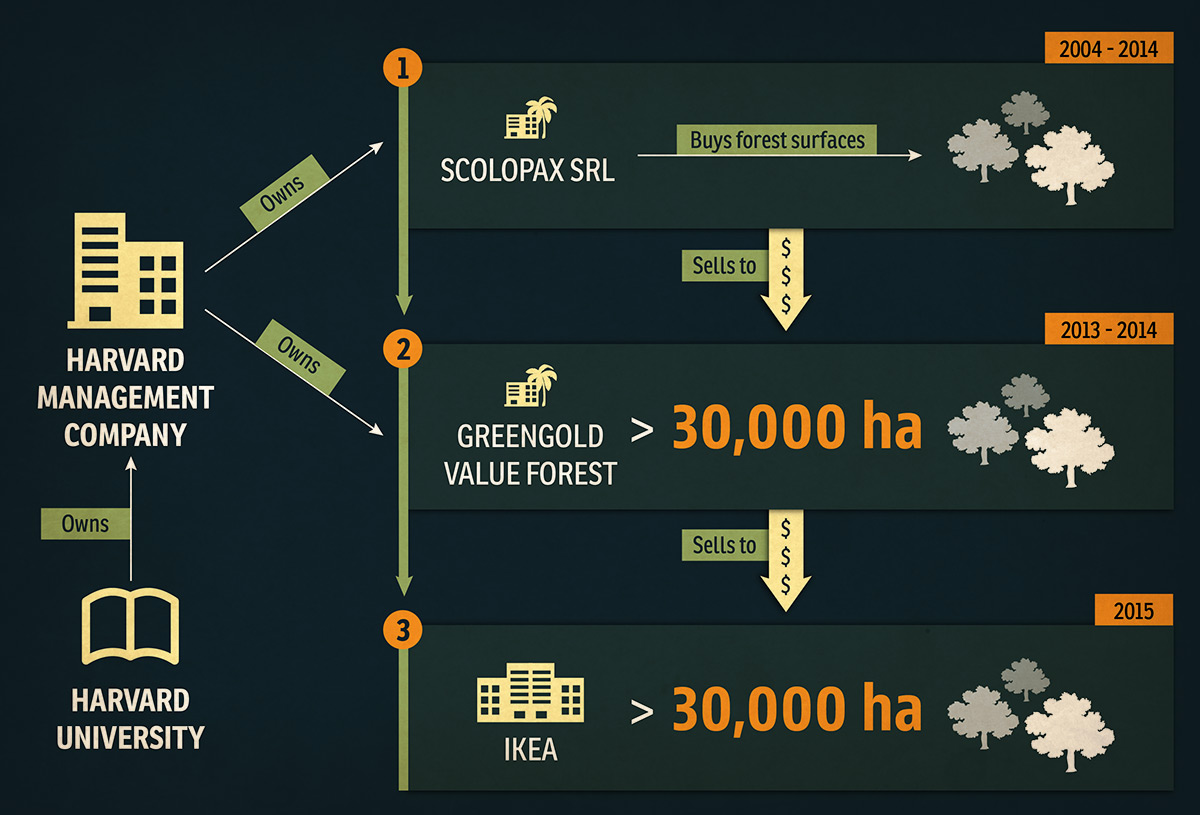Harvard University is the symbol of American intellectual and political power – producing eight US presidents and many of the leaders of American industry.
But for the past year, Harvard have been sitting in Romanian courts trying to keep control of national forest they bought. The state says Harvard bought some of its land from a group of figures that are under investigation for cheating the state. Subsequently IKEA bought the same forests from offshores controlled by Harvard’s investment fund.
To say these two global brands may have been duped may not be accurate. Unlike IKEA’s furniture, these deals are turning out to be neither smartly designed nor inexpensive for either organization.
Starting in 2004, Harvard bought more than about 33,000 hectares (83,000 acres) of forest land in hundreds of small tracts through local intermediaries that Romanian prosecutors have since charged with corruption and organized crime activities or who are under investigation. The deal between Harvard and IKEA also followed an unusually complex route and was facilitated by another group of Swedish- and Luxembourg- based companies connected to, or controlled by, the American university.
Romanian authorities are challenging some of the transactions on the grounds that state-owned forests were illegally reclassified as private property through a restitution program designed to return nationalized land to its former owners.
A Romanian judge has already invalidated one property deed in Harvard's portfolio, ruling that the forest was not acquired in good faith. Because the same group of suspected fraudsters bought much of Harvard’s land, it’s possible that many more tracts may end up being returned to the state.
And that is a problem for IKEA, which bought the land from Harvard and may lose some or much of its newly acquired Romanian woods as well.
Toxic Woods
Romania’s forest restitution program has been riddled with corruption and major scandals almost since it started. High-profile politicians, controversial businessmen and even a member of Romania’s royal family have been arrested and charged with corruption and money laundering in connection to the deals.
Forest restitutions grew out of Romania's turbulent history in the last century, when the Communist regime nationalized private property nationwide and many people lost land that had been in their family for decades.
After 1989, new laws in the post-Communist Romania allowed former owners and their relatives to seek restitution for their lost properties. Unfortunately, these same laws created opportunities for fraud.
Crooked businessmen and dirty politicians seized the moment, forging documents and claiming forests that had never belonged to them or to their ancestors. In many cases, fake relatives armed with piles of forged paperwork claimed some of the last standing old-growth forests in Europe and quickly sold them to foreign companies who poured tens of millions of dollars into such deals hoping for great returns.
Harvard University, through its investment arm, became a major buyer of Romanian forests starting in 2004, eventually purchasing some 33,600 hectares (83,000 acres) of forest land despite longstanding rumors of corruption in the restitution program.
Then, at the end of June 2015, Harvard University abruptly sold most of the land to IKEA. The deal was done through a series of steps that started in 2014 when Harvard first sold the land to a Romanian company owned by offshore companies controlled by Harvard, and then IKEA took over ownership of the Romanian company.
IKEA paid more than € 56 million (US$ 62.6 million or $73 an acre) for about 98 percent of Harvard’s forest, the biggest investment in raw forests for the Swedish giant. The forests owned now by IKEA are scattered all over the country with the biggest concentration in the northeast. Harvard, which had paid more than $100 million for the properties, sold them for two-thirds of what they had paid in cash, along with an agreement that IKEA assume an unknown amount of debt that Harvard had incurred.
By the time Harvard and IKEA shook hands over the forest deal in 2015, the Romanian government was already challenging some of Harvard’s acquisitions in court. Those properties, regarded as toxic assets, included just a few hundred hectares of their overall purchases, and were not included in the deal with IKEA.
Harvard, however, knew something else that was important. Three months prior to the deal, the Romanian citizen who had been purchasing forests on Harvard’s behalf was sentenced to jail for corruption related to these forest acquisitions. The hundreds of hectares in contention may be the tip of the iceberg.
IKEA, despite an audit conducted by its lawyers that said the land was mostly clear of problems, had more disputed forests on its hands.
A Long Process
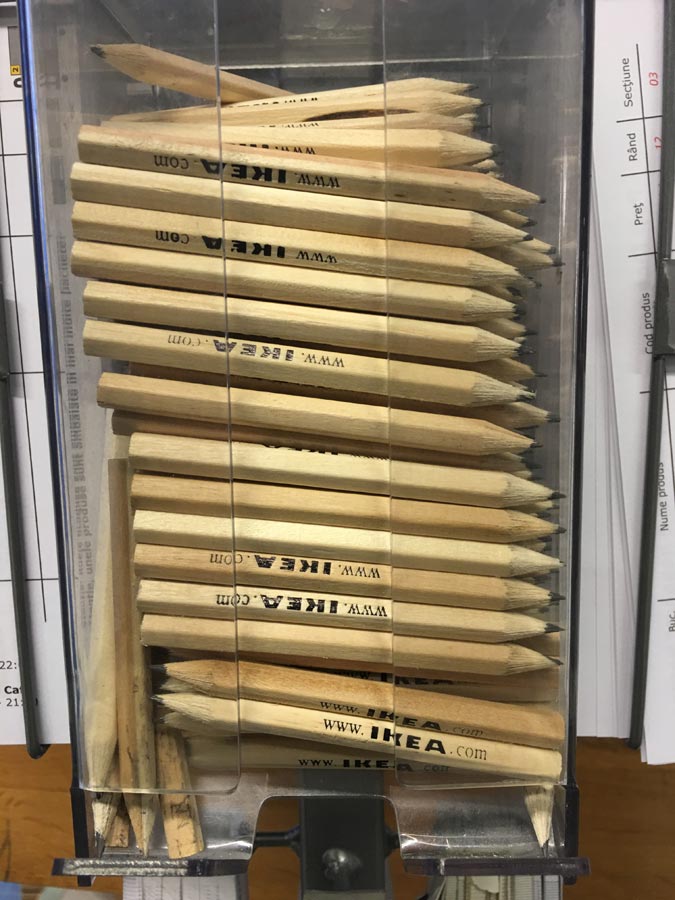 While large tracts of land may have been stolen, the government must go through a tedious series of legal steps to regain the forests. The first step in the process is to go to court to invalidate the property deeds. Then the state needs to file suit against the current owners of the forests.
While large tracts of land may have been stolen, the government must go through a tedious series of legal steps to regain the forests. The first step in the process is to go to court to invalidate the property deeds. Then the state needs to file suit against the current owners of the forests.
The legal process, never quick to begin with in Romania’s overburdened courts, becomes more cumbersome when the new ownership is buried under layers of nested companies as in the Harvard-IKEA deals. It’s not clear why Harvard set up such a complex system of layered companies which started with the university selling the forests to itself, and Harvard would not answer questions from OCCRP citing pending litigation.
According to documents obtained by OCCRP, in May of 2015, three months before the deal was concluded, IKEA instructed its lawyers from the law firm of Wolf Theiss Rechtsanwalte GmbH to investigate the Harvard forests.
The lawyers filed a request under the Romanian Freedom of Information Act (FOIA) with the Romanian Forest Agency, Romsilva. They asked a local branch of Romsilva in the county of Vrancea for information regarding existing litigation involving the forests owned by Harvard.
The Vrancea forest officials answered that the requested information did not fall under FOIA and that they couldn’t answer anyway as the request described the location and size of the properties using a different system than the one stipulated by the agency’s own indexes.
More than 13,500 hectares (34,000 acres) of IKEA's Romanian forests are located in the county of Vrancea. This is also the place where IKEA ran into the most trouble. The furniture and design company claims in an answer sent to OCCRP that it checked out the properties carefully: “We have made a full legal due diligence on the properties we have acquired. This due diligence is more extensive than only performing (a) check in the registry or checking the local municipality for potential issues. It involves a detailed review (of) the historic ownership chain.”
A contract obtained by OCCRP between the state forestry company Directia Silvica Vrancea and IKEA to safeguard the land labelled more than 491 hectares (1,200 acres) as being in litigation. In an answer to OCCRP questions, IKEA acknowledged the situation: “Directia Silvica Vrancea has added the word ‘litigation’ as a comment to seven areas. However, in our due diligence, which was completed in June 2015, these areas were not identified as disputed.
The Swedish company added: “We are not content with the situation and because of this, we decided not to progress with any activities in the specified areas until the matter has been officially clarified.”
A week later IKEA came back saying that, according to authorities, 400 hectares (990 acres) were in contention and the company planned to cooperate with any investigation.
An Enigmatic Entity
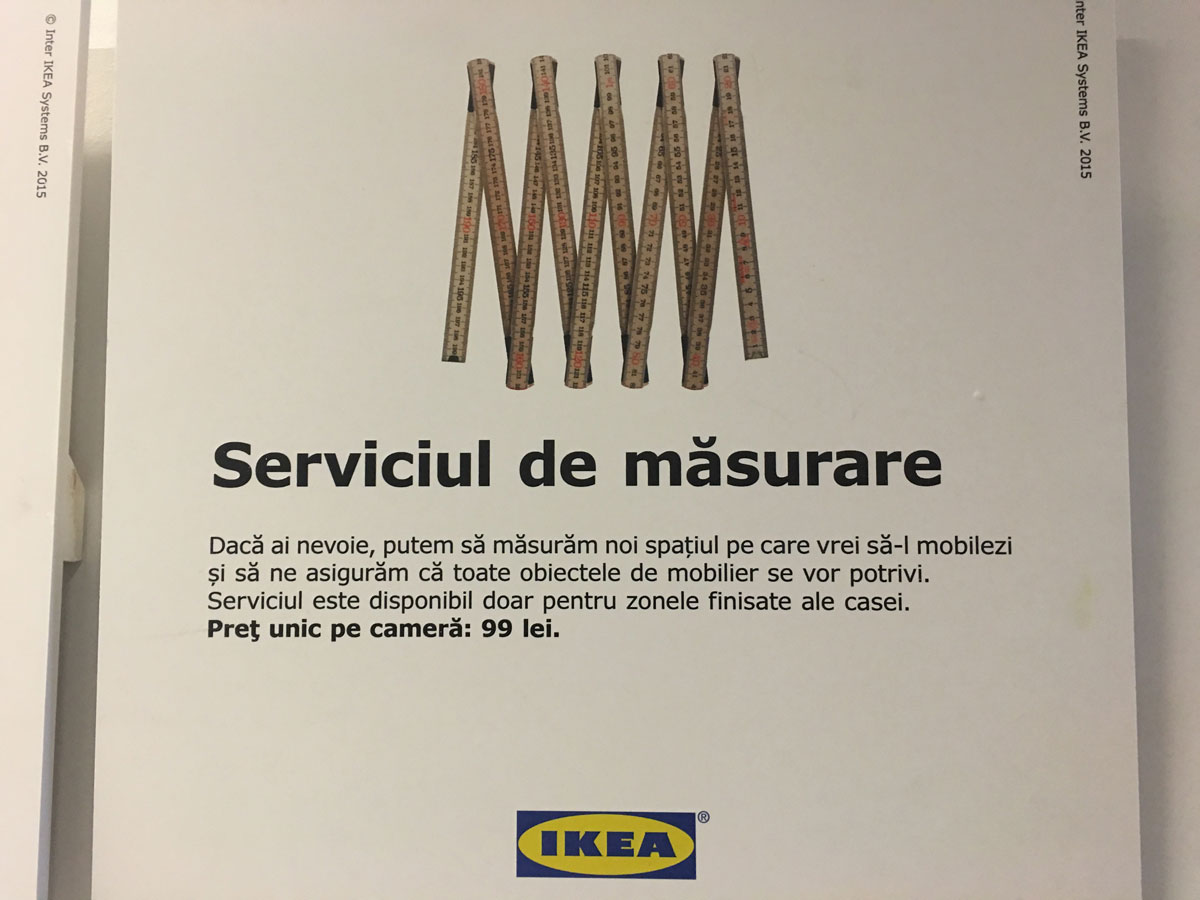 At the heart of the problem is how the forests were purchased. Harvard initially acquired many of its forests from a controversial group of Romanian businessmen and politicians that police nicknamed the Enigma group after a restaurant where members sometimes met. Members of the group are under investigation in other forest-fraud related cases.
At the heart of the problem is how the forests were purchased. Harvard initially acquired many of its forests from a controversial group of Romanian businessmen and politicians that police nicknamed the Enigma group after a restaurant where members sometimes met. Members of the group are under investigation in other forest-fraud related cases.
OCCRP reporters viewed a Romsilva document in which the state agency claims that 400 hectares now in IKEA’s possession were initially illegally acquired by the Enigma group.
Romanian prosecutors, in answer to an OCCRP FOIA request, said that 500 hectares (1,400 acres) of forest sold by the Enigma group to Harvard-controlled companies in Vrancea County are under criminal investigation for corruption related to the restitution process. The 500 hectares include the 400 hectares of IKEA forests described above.
The Enigma group is also being sued by local authorities in the neighboring county of Buzau, in order to cancel a property deed for another 226 hectares of forest in Gura Teghii, a commune in Buzau.
A Bad Business Design By Harvard
Harvard’s Romanian forest ventures began on Oct. 21, 2004, in a house in Sohodol, a village only a few kilometers away from the picturesque 14th century Bran Castle in the mountains of Transylvania in central Romania – often referred to as Dracula’s castle.
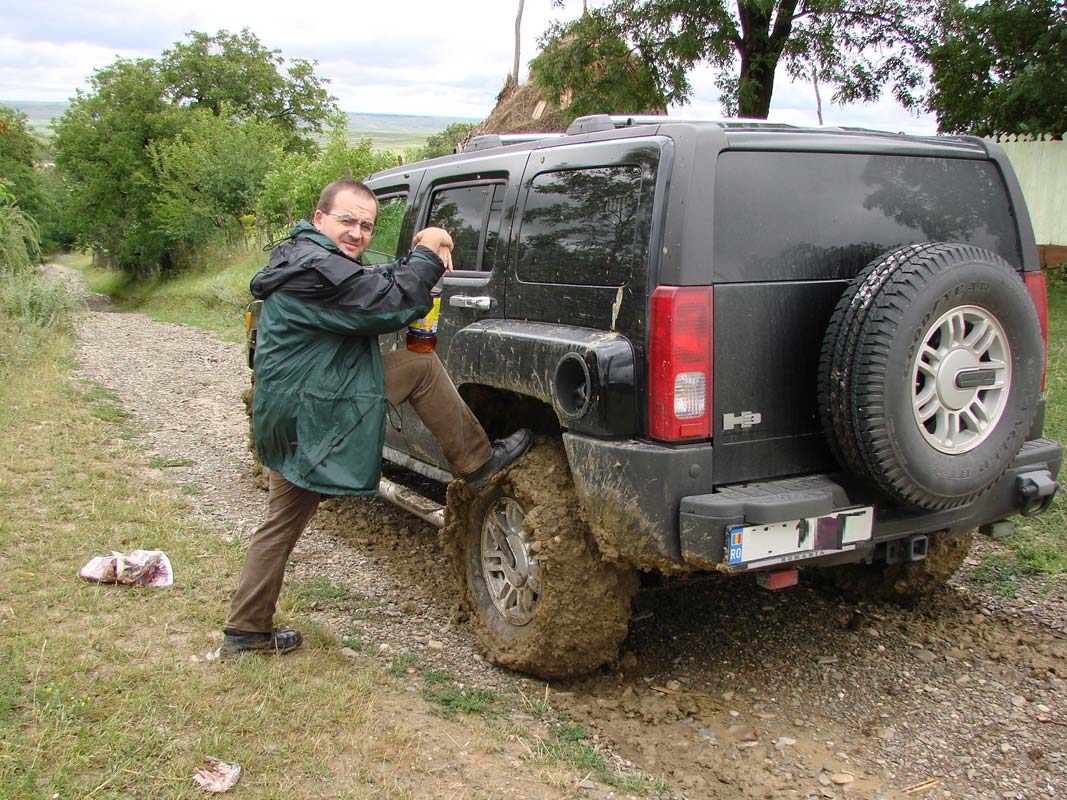 Dragos Lipan The house was owned by Dragos Lipan, a Romanian citizen who would become the main buyer of Romanian forest for Harvard and who would later being sentenced for corruption related to the deals.
Dragos Lipan The house was owned by Dragos Lipan, a Romanian citizen who would become the main buyer of Romanian forest for Harvard and who would later being sentenced for corruption related to the deals.
Harvard, through its investment company Phemus Corporation, established a limited liability company that day named Scolopax SRL.
Lipan’s former wife spoke with OCCRP reporters in the Sohodol house and confirmed the meetings and that the firm was established there.
That same day, another commercial company named Oriolus Limited was established in the Sohodol house by a Swedish citizen, Jonas Jacobsson, and three fellow Swedes. Jacobsson was also one of Scolopax’s appointed managers and would become a key person in the Harvard-IKEA Romanian forest deal more than a decade later. Oriolus later managed some of Harvard’s forests in Vrancea County.
The first decision of Scolopax’s board was to give Lipan power-of-attorney in the company’s interactions with banks, courts, local authorities and private persons. Lipan became the designated business representative of Harvard’s investment company in Romania.
Nine days later, on Nov. 25th, Jacobsson, on behalf of Scolopax, gave Lipan the authority to buy forest areas of up to 500 hectares for up to € 500,000 (US$ 558,600) or about US $1,200 a hectare (US$ 450 an acre). A year later, in January 2006, Lipan received 15 percent of Oriolus, the other company where Jacobsson was already a significant shareholder with 40 percent.
By 2010, Harvard became the largest private forest owner in Romania controlling more than US$ 100 million worth of Romanian investments, most of it forests, through Phemus Corporation, a US tax-exempt 501(c3) organization founded in Boston. Lipan became the go-to person for forest owners. The massive amount of money that Harvard was pouring in the country’s forests was unprecedented, and within just a few years Lipan was taking advantage of his privileged position to benefit himself.
In 2007, Lipan entered an agreement with another Romanian, Robert Eler, to buy 2,500 hectares of forest at an inflated price under the condition that Eler would return 30 percent of the profits to Lipan. The problem was that Eler owned no forests, so he started looking for forests for sale to be able to conclude the deal with Scolopax and Lipan.
Scolopax started buying from Eler and soon Lipan had € 1 million (US$ 1.1 million) in his bank account.
But these deals may have violated Romanian law. According to the Romanian law, the state has pre-emptive buying rights or the first right to buy forests on sale by private owners at the asking price. The sellers need to inform the state about the sale and wait for 30 days before they can sell to other interested parties. Failure to do so could invalidate the deal. But most purchases were done quickly after Eler and his associates obtained deeds for the freshly acquired forest.
The scheme worked until the relationship between Eler and Lipan soured and Eler and his associates turned on Lipan, denouncing him to the Romanian prosecution.
Lipan said he stopped working with Scolopax in 2013. However, by this time, he had bought tens of thousands of hectares of forest, most of it from Eler or the Enigma group whose members are now being investigated for forest corruption.
Harvard VS Harvard
In the spring of 2015, Lipan was given a three-year suspended sentence for bribery and money laundering connected to the forest deals he concluded for Scolopax between 2007 and 2008. According to the prosecution, Lipan used his position with Scolopax to promise favorable deals in exchange for bribes, including an expensive car and a trip to the Canary Islands.
In an interview with OCCRP, Lipan said due-diligence was conducted but that they didn’t have the resources to look too deeply: “There weren’t look-ups for the relatives of the person who owned the property deed, there weren’t announcements in the press to find if someone else claimed the forests. If these persons (i.e. the private forest owners) were presenting a valid property deed, verifiable, inscribed in the property registry, with taxes paid, which under Romanian law (is) sufficient for a transaction, then we did the transaction.”
Lipan said Harvard’s lawyers checked the documents but did not investigate. The documents then went to Jacobsson who approved the purchases.
“Blaming me is convenient. All the properties (i.e. purchased properties) were documented and approved by Mr. Jacobsson, according to internal standards. Sometimes, when the transactions went beyond certain sums, other administrators in Scolopax approved them,” added Lipan.
Lipan tried to overturn the three-year suspended jail sentence but the Supreme Court denied his appeal in December 2015.
 Two days after a warrant was issued for Lipan’s arrest, Scolopax pasted announcements on the walls of city halls in various Romanian towns and villages advertising the sale of its forests. According to Romanian law, the state needs to be informed about potential forest deals as it had the right to preempt the sales. However, it did not exercise its right to buy Scolopax’s forests because they knew they were already challenging some of the forest restitutions in court.
Two days after a warrant was issued for Lipan’s arrest, Scolopax pasted announcements on the walls of city halls in various Romanian towns and villages advertising the sale of its forests. According to Romanian law, the state needs to be informed about potential forest deals as it had the right to preempt the sales. However, it did not exercise its right to buy Scolopax’s forests because they knew they were already challenging some of the forest restitutions in court.
Documents obtained by OCCRP indicate that Jacobsson, Harvard’s business manager in the country, was aware of problems with the Romanian forest acquisitions long before Lipan was arrested and convicted. A confidential report commissioned by Jacobsson in December 2010 points to other issues related to the purchases. The report was drafted by Salans Moore, a Bucharest law firm, which found that some of the areas bought by Harvard could be annulled because the preemptive right of the Romanian state was not respected. The Salans lawyers found the law was not always clear and recommended that: “In light of the aforementioned, given the risks associated, you may wish to verify the availability of title insurance from a reputable insurance company in the aim to cover inter alia such risks related to possible breach of preemption rights.”
Jacobsson was contacted by OCCRP but refused to comment on the Salans report or on any other matter surrounding the Romanian businesses.
In November 2013, a mystery buyer showed up: the Greengold group of companies. The group was in fact controlled by Harvard through a complicated business scheme running through Luxembourg, Sweden, the American state of Delaware and Romania.
According to documents obtained by OCCRP, the Greengold scheme was set up in 2012 and 2013 when Harvard’s troubles with the Romanian authorities were just beginning. Around that time, Harvard established a group of Greengold companies in Romania, including Greengold Value Forests SRL, the company that bought most forests from Scolopax, and Greengold Future Trees SRL, where Harvard parked the toxic assets. Both companies were controlled by Harvard via a Luxembourg-based company.
From 2006 to 2012, another group of Greengold companies was established in Sweden by a group of Romanian and Swedish citizens including Jacobsson, the businessman who started Harvard’s business in Romania in Lipan’s home back in 2004.
Ownership documents of the Greengold groups do not show any legal connections between the Swedish Greengold group and the Romania-Luxembourg-Delaware Greengold group but US tax forms (990s) filed with the American Internal Revenue Service show that, in 2012, Harvard University, via its Phemus Corporation, paid US$ 2.38 million to Greengold Sweden for “investment management.” The following year, the university poured just shy of US$ 2 million into the accounts of the Stockholm-based company.
The Swedish Greengold group included a few Romanian citizens, including Valeriu Norocel Nicolescu, a professor and doctor in forestry science who teaches in a Romanian university. Nicolescu told OCCRP that he left the company before the deal with Harvard was concluded because he felt that something was not right with the company. He refused to elaborate.
Costel Chiorescu is another Romanian-Swedish citizen and the president of Greengold Sweden. He was previously involved with another Harvard-controlled company in Romania, Romply Merops SRL. Romply Merops was running a poplar plywood factory, based in Calarasi, Romania.
OCCRP obtained the contract between Scolopax and Greengold Value Forests SRL Romania, which is in fact a contract drafted between two parties controlled by Harvard.
The document contains a clause which says that that the buyer, Greengold, can reclaim its money if investment in the acquired forest becomes subject to litigation or if a third party claims rights over the forests. The same contract clause stipulates that costs related to litigation attached costs will be covered by the seller, Scolopax.
The Good Faith Issue
Less than one year after the Greengold deal, IKEA entered the stage. The Swedish furniture giant took over Greengold Value Forests SRL and its forests and changed the company’s name to I.R.I. (IKEA Resource Independence) Forest Assets SRL, a limited company. IKEA has refused to comment on whether the previous Scolopax-Greengold contract and the litigation-and-money-recovery-related clause is part of the deal it made with Harvard. The question has proved significant in previous deals.
A Romanian judge previously invoked the clause when issuing a verdict to strip Harvard of one of its forests in Romania. The verdict was issued on Nov. 23, 2015, when a judge in the city of Galați stripped Harvard of 108 hectares of forest because it was illegally acquired. The judgment was appealed by Harvard this February.
The court’s decision was a follow-up to a 2010 judgment that invalidated the property deed connected to this forest, ruling that the restitution was illegal. Based on this verdict, the state moved through the chain of buyers eventually reaching Harvard and annulled the deal because it was based on fraud.
During the court case, Harvard lawyers maintained to Romanian judges that they were not aware of the problems with the Romanian forests and that they bought them in good faith.
However, the judge concluded that the way the contract was drafted back in 2008 indicates that Harvard's Romanian subsidiary had doubts regarding the legality of the forests’ purchases and could not invoke good faith.
This same forest is part of a larger, 3,000-hectare area that is the subject of a criminal investigation started in September 2015. Romanian prosecutors told OCCRP that they are looking to file charges for money laundering and organized crime in this case, too.
Harvard refused to answer OCCRP’s questions saying that they cannot provide comment on pending and active litigation.
Romanian language version on RISE Project
Written by: Daniel Bojin, Paul Radu, Hans Strandberg (Dagens Arbete)
Contributors: Cristi Ciuperca, Andrei Ciurcanu
Graphics: Sergiu Brega
Video: Matt Sarnecki and Sergiu Brega




